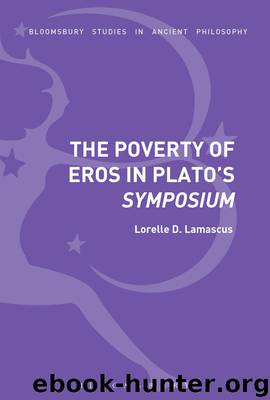The Poverty of Eros in Plato’s Symposium by Lorelle D. Lamascus

Author:Lorelle D. Lamascus
Language: eng
Format: epub
Publisher: Bloomsbury UK
The use and work of Eros as intermediate: The moral consequences of the metaphysical status of Eros’s intermediacy
Given that Eros is an intermediate, the question arises as to the consequences of this status for the relationship of Eros to virtue. But the meaning of Eros’s intermediacy seems consequent upon the interpretation of Eros as designating only a relation or as additionally designating something metaphysical. Since Allen takes the personification of Eros to be an obfuscation of the philosophical analysis of Eros as relation, he understands its intermediacy in a manner that reflects this. He provides the following analysis of intermediates:
Sometimes intermediates are described as having a share of opposite qualities; if Eros were intermediate in this sense, it would be both good and bad, beautiful and ugly, mortal and immortal. In another sense, intermediates instead of possessing both opposites possess neither. In the Gorgias (467 ff.; compare Lysis 216dff.), for example, intermediates are actions and physical objects that take their value, not from their own nature, but from their purpose or use; they are neither good nor bad in themselves. The intermediate character of Eros is of this kind. In itself, it is neither good nor bad; it takes its value from its objects. Thirst, for example, the desire to drink, is neither good nor bad in itself; its value is determined by the effect of its gratification in particular circumstances.8
For Allen, then, because Eros is merely relational, it is the sort of intermediate that is neutral because of its existence between good and bad. It can be directed toward bad objects, and Allen’s argument concludes that it is the choice of object that determines the worth of Eros. An example of Eros directed toward something bad is found in the description of the tyrannical man in the Republic, whose Eros is directed toward the wrong kinds of objects; but the love of the wrong objects does not seem adequate to account for the anarchy that characterizes the tyrannical man. He is insatiable in part because he loves the wrong kinds of objects too much, and in part because he is unable to distinguish between the better and worse objects available to him. Eros does not rule and corrupt the tyrant merely because he pursues the wrong objects; the tyrant is ruled by the objects of his desire because he has an improper relationship to them.
Allen’s remark above that “actions and physical objects that take their value, not from their own nature, but from their purpose or use” does not seem to resolve this difficulty; indeed, it further complicates his assessment of the intermediate nature of Eros and of desire. If we consider a particular action, like running, it is apparent that the ability to run is a good, though it may be used badly.9 The ability to run is essential to the survival of a number of animals, including humans, if only for the purpose of fleeing danger. But the final good of such an ability is the well-being of the agent who possesses it.
Download
This site does not store any files on its server. We only index and link to content provided by other sites. Please contact the content providers to delete copyright contents if any and email us, we'll remove relevant links or contents immediately.
| Africa | Americas |
| Arctic & Antarctica | Asia |
| Australia & Oceania | Europe |
| Middle East | Russia |
| United States | World |
| Ancient Civilizations | Military |
| Historical Study & Educational Resources |
The Daily Stoic by Holiday Ryan & Hanselman Stephen(3300)
The Fate of Rome: Climate, Disease, and the End of an Empire (The Princeton History of the Ancient World) by Kyle Harper(3055)
People of the Earth: An Introduction to World Prehistory by Dr. Brian Fagan & Nadia Durrani(2727)
Ancient Worlds by Michael Scott(2682)
Babylon's Ark by Lawrence Anthony(2671)
The Daily Stoic by Ryan Holiday & Stephen Hanselman(2569)
Foreign Devils on the Silk Road: The Search for the Lost Treasures of Central Asia by Peter Hopkirk(2455)
India's Ancient Past by R.S. Sharma(2450)
MOSES THE EGYPTIAN by Jan Assmann(2411)
The Complete Dead Sea Scrolls in English (7th Edition) (Penguin Classics) by Geza Vermes(2277)
The Earth Chronicles Handbook by Zecharia Sitchin(2226)
Lost Technologies of Ancient Egypt by Christopher Dunn(2223)
24 Hours in Ancient Rome by Philip Matyszak(2078)
Alexander the Great by Philip Freeman(2064)
Aztec by Gary Jennings(2021)
The Nine Waves of Creation by Carl Johan Calleman(1915)
Curse Tablets and Binding Spells from the Ancient World by Gager John G.;(1860)
Before Atlantis by Frank Joseph(1849)
Earthmare: The Lost Book of Wars by Cergat(1823)
